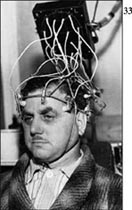The Lie Detectors (49 page)
Authors: Ken Alder

With his showman’s flair, William Marston (right) made a comeback in the late 1920s, inviting reporters to the Embassy Theater in midtown Manhattan to watch him use his lie detector to prove that blonds were more emotionally reactive than brunettes. His evidence? The response of starlets to Greta Garbo and John Gilbert making love in
Flesh and the Devil.
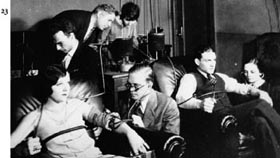
On this basis, Marston was hired by Universal Studios to prescreen movies for emotional content, making him a pioneer in audience testing and studio self-censorship. He can be seen in the back, hunched over the machine, alongside his longtime mistress, Olive Byrne, who lived with Marston and his wife and was the mother of two of his four children.
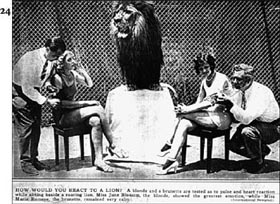
Marston (left) lasted only a year in Hollywood. Behind his mockery of sexual conventions was his own all-encompassing theory of human emotion. Based on experiments at movie screenings and sorority hazing rituals, it posited that dominance and submission were the primordial poles of human feelings, and that both men and women enjoyed submitting to women who were themselves submissive to love.
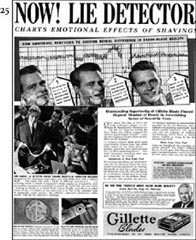
Back in New York, Marston used his device to conduct market research—and vouch for products, as in this 1937 ad. John Larson was appalled by Marston’s attempts to make him complicit in these claims.
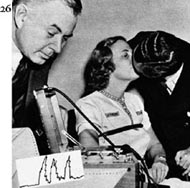
In the 1930s, Marston used his lie detector to dramatize the damage done by the lies men and women told themselves, urging Americans to free themselves from "twists, repression and emotional conflicts." In this
Look
photo spread of 1938, Marston assures a young bride that her marriage can be saved, even though a stranger’s kiss is more thrilling than her husband’s.
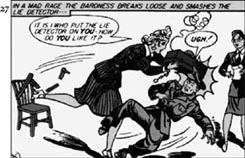
Marston’s greatest success came in 1940 when he created Wonder Woman, the embodiment of all the psychological principles he had glimpsed in the science of lie detection. In her first solo issue of 1942, Wonder Woman, disguised as Diane Prince, watches as her boyfriend Steve fails to extract the truth from the Nazi Baroness. Wonder Woman later converts the Baroness to the American cause by teaching her to submit to love.
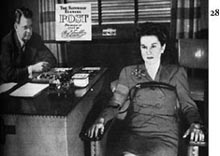
In the 1940s, Leonarde Keeler, famous as the inventor of "The Magic Lie Detector," became a founding member of the Court of Last Resort and touted the device as an instrument of exculpation. In 1947 he played himself in a Hollywood movie,
Call Northside 777,
based on the exoneration of Joe Majczek, falsely imprisoned for killing a cop.
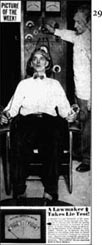
In the 1930s and ’40s many rivals went into the lie detector business using their idiosyncratic methods. Keeler’s nemesis, Orlando Scott, claimed to track "brain waves," but actually measured galvanic skin response (i.e., sweatiness). Yet his terrifying instrument proved effective at extracting confessions. Here he is in 1948 testing an Illinois state representative accused of extorting money from Joe Majczek.

In 1946, in response to accusations that Soviet spies had infiltrated America’s nuclear facilities, Keeler and his "box" were brought down to Oak Ridge, Tennessee to safeguard America’s most potent weapon. He found no spies, but plenty of employees who had fibbed on their applications or believed in federally subsidized housing. In the process, Keeler transformed his device into a psychological deterrent and a gauge of political loyalty.
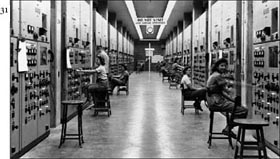
Between 1947 and 1953, some 18,000 residents of Oak Ridge were tested numerous times. Terminated as scientifically suspect, polygraph screening was reinstated at the nation’s nuclear weapons labs in 1999 in the wake of the (erroneous) accusations against Wen Ho Lee. These tests continued despite a 2003 report by the National Academy of Sciences suggesting that this sort of security screening is ineffectual, harmful to morale, and a distraction from real security measures. In 2006, the program was being scaled back.
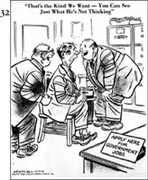
This Herblock cartoon from the McCarthyite era (1954) expresses the argument of Edward Shils in
The Torment of Secrecy:
that the era’s populist zeal to root out secret conspiracies had overwhelmed the cognitive privacy that is the basis of political conscience. Among other notorious applications, the lie detector was used in this period to "out" homosexuals at the State Department.
